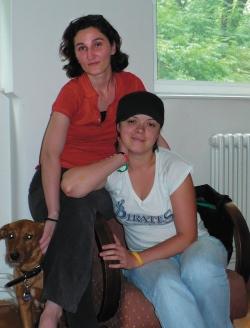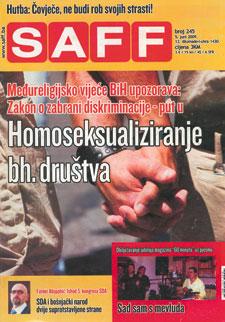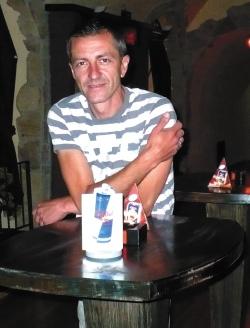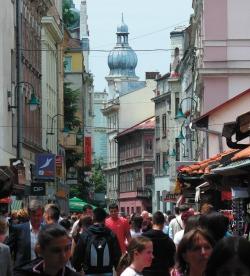
VIOLENT REACTION. Svetlana Ðurković (top) and Alma Selimović, here with mascot Dunav, saw their festival guests attacked by thugs and extremists. Credit: Jim Bartley

HEADLINE HUNTERS. The cover line reads, "Inter-Religious Council of BiH warns: Law prohibiting discrimination is the way to the homosexualization of Bosnian society." Credit: Jim Bartley

STRENGTH IN SMALL NUMBERS. "In Sarajevo, there are only three or four open, proud-to-be-gay people," says longtime human rights activist Mahir "Maki" Žiško. Credit: Jim Bartley
Driving through the green hills of central Bosnia this summer, I stopped to gas up. As I slipped behind the wheel again a figure appeared at the window, a beefy thirtysomething with a gelled-up soccer star hairdo: Ivo. He needed a lift.
Fourteen years post-war, Bosnia and Hercegovina (BiH) is still warring in its collective psyche, a country of deep enmities, chronic corruption and political deadlock, but I haven’t yet had a bad experience with a hitchhiker. In Ivo’s boyish shrugs, his melancholy half-smile, I sensed mostly resignation. He asked my destination: Mostar. We agreed it was a beautiful old town. He began to thrust his middle finger into the clenched pussy of his other hand: “In Mostar, maybe…?” I said maybe.
We passed a motel and he gestured at it, then did a different mime, his palm slap-humping the opposite fist. “Ja, ti,” he said: “I, you.” I had no time to spare, nor much desire to put my tentative trust of Ivo to the test. When I declined he shrugged easily, then as we passed a series of craggy hilltops he began pointing out the spots where gun emplacements once rained shells on the valley.
Ivo raised a memory from an earlier visit to BiH. Summer of 2001, bumping along a gravel road east of Sarajevo, I stopped for a willowy young guy in a sky-blue T-shirt. I’ll call him Damir. Even before Damir got into the car I was pretty sure I had his number. He’d been beside me only moments before we were deep into the give-and-take that would or wouldn’t end in consummation. Exchanging our destinations (he his family, I my motel) firmed up the options. I invited him back to the motel. A little later, as we passed the turnoff to his village, he changed his mind. He had promised he would visit his grandmother that afternoon — would I like to meet her?
This June I spent two days in Damir’s village with his family. As usual, they treated me like a fond uncle, even butchering a sheep for our dinner. In private, Damir hesitantly announced that he had something to tell me. With an awkward smile he said that he now had a girlfriend. He dug out his wallet and showed me a picture. She lived in a nearby town. They would get married, he said, probably next year.
You might think that Damir was making a mistake. Knowing something of his world, I think the marriage (not an arranged one) is probably his best option. Village life defines and anchors him. To be fully gay would mean abandoning his home and homeland, perhaps moving to Zagreb or Berlin or Amsterdam — or settling in Sarajevo to eke out a life of risk and subterfuge. Damir has a tightknit and loving family. Sadly, in their world, “gay” simply does not compute.
***
Some in Bosnia are determined to change that. In Sarajevo I spoke at length with Svetlana Ðurkovi, whose inspired brainchild, Organization Q (OQ), has come to define the emerging public face of queer rights in Bosnia. Founded by Ðurkovi and a male friend in 2002, OQ’s longtime discreet profile finally braved full exposure to media glare last September — with mixed results.
I met with Ðurkovi in June, at OQ’s third floor walkup space in an old office block pocked with shrapnel scars. For Sarajevo’s queer community, lingering evidence of wartime is overlaid with fresher wounds. Last September, OQ’s inaugural Queer Sarajevo Festival — BiH’s “first public queer event” — opened at the city’s Art Academy in defiance of anonymous death threats and verbal attacks from a broad range of public figures.
At the opening party the crowd was attacked by street thugs and Muslim religious extremists. Print and broadcast media buzzed with the story, forcing Ðurkovi and her colleagues to defend their ideals against political and religious leaders who blamed OQ’s “provocation” for the violence. Meanwhile they were hounded by further death threats, the online posting of their office address and the gruesome manipulation of their web imagery to show the bloody beheading of a queer. Rather than put attendees at further risk, they felt obliged to cancel the remainder of the festival.
I had a small taste of this public anger myself, strolling through the old Turkish market of Sarajevo with the co-founder of OQ (who requested the moniker “Sebastian”). Chatting about gay male relationships, we were nearing a carpet shop when I heard a sarcastic voice mimic my word, “together.” The shopkeeper, decked out in Turkish cap and elegant kaftan, scowled at me and angrily repeated, “Together, yes, but not here.” He raised his hands and shooed us away like we were street trash. I caught Sebastian’s eye and he shrugged it off: “You see.” The shopkeeper’s attitude is far from the exception. Visible discomfort with queers and open discrimination are still broadly accepted even in this increasingly sophisticated capital city, forcing all but a few brave souls to hide their love lives and play it straight in public.
Sebastian is no longer active with OQ. He disagrees with Ðurkovi’s move to high-profile public events, favouring quieter initiatives such as the effort to secure rights legislation. OQ has had recent support on the legal front from Bosnia’s Office of the High Representative (OHR). Administered by the European Union, the OHR was installed in 1995 to enforce the provisions of the Dayton Accord ending the Bosnian War.
The OHR’s stated mandate is to ensure that BiH “evolves into a peaceful and viable democracy on course for integration into the EU.” Ðurkovi underscored that full human rights law is crucial to the goal of joining Europe and weaning the country from the influence of extremists, criminals and corrupt politicians.
***
Quiet and vaguely scholarly, Ðurkovi’s manner contrasted with the more upfront queer-ish style of OQ members Emina Trumi and Alma Selimovi. As we relaxed in the small lounge area of the two-room office, I asked if there are any gay or lesbian bars in Sarajevo. All three quickly said no. Even the handful of bars known as friendly are “not well attended” by queer folk. “You go to a place that you think is relatively safe,” said Trumi, but even then it invites harassment, said Selimovi, “if you look different, if your hair or clothing looks ‘queer’ to them.” One solution has been to schedule invitation-only dances at two or three amenable bars in the city centre. Though OQ’s official membership numbers fewer than 100, they said the party crowd can top 200, about equally male and female. They’ve also hosted private dinner parties and picnics.
For Pride, OQ has orchestrated covert “street actions,” kicking off in June 2006 with an overnight installation of rainbow umbrellas in a city park. Other actions include queer graffiti, rainbow ribbons and a blitz of rainbow AIDS-awareness scarves draped over statues and monuments. The strategy of pitching the actions as art culminated in last fall’s ambitious Queer Sarajevo Festival program at the Art Academy, including a planned screening of Canadian director John Greyson’s film Lilies. About 300 people thronged the Academy for the opening, funded in part by the Swiss, Dutch and Canadian embassies.
Sadly, the violence cut things short. After leaving the reception, guests were ambushed by gangs and beaten. Despite a police presence, at least 10 people were injured, eight were hospitalized.
Ðurkovi is unwilling to label police as hostile or indifferent. “I think they were not ready. They said themselves that they had a lot of shortcomings.” Ðurkovi blames the public prosecutor’s office, alleging it failed to respond to criminal threats as the festival approached. A year later, despite photos and video evidence from the attack, only two people have been indicted. Only two of Bosnia’s more than 20 political parties have publicly condemned the violence and supported gay rights legislation. Among religious leaders interviewed in a popular magazine, the Jewish representative was alone in saying that queer rights belonged in the legal realm.
Ðurkovi and her colleagues described the opening night crowd as mostly straight — artists, writers, media people and supporters from the large expatriate community working for foreign NGOs and embassies. They blamed the low queer turnout on fear of individual exposure, plus the general perception that media coverage only encourages abuse. Those fears aside, they believe the visible courage and support of the large crowd was hugely encouraging. “It’s a first,” said Ðurkovi.
***
That evening I sought out a new bar mentioned by Ðurkovi. The Cave Club clings to an almost vertical hillside on the bank of the Miljacka River opposite Sarajevo’s central marketplace. A big white cube accessed by a footbridge, it suggests a modernist fortress with its own moat and drawbridge — a good place to weather a siege.
I’d been told at OQ that people were “afraid to go there,” but I was barely across the red-carpeted bridge before I encountered three men on the terrace lounging on large cushions. One eyeballed me with demure interest, sipping his colourful cocktail through a straw. It did feel decidedly like home. Maki, a sinewy fellow in a tight T-shirt, welcomed me and directed me down a twisting pink and lavender stairwell to an underground disco with pulsing lasers and plush banquettes — and not a person anywhere. He said the fun would start later, but due for an early morning I said I’d return on the weekend.
Maki — Mahir iško — turned out to be both the owner of Cave Club and a longtime human rights activist who once worked with war-crimes victims. An intense and chatty fortysomething with a lean swimmer’s frame, iško joined me on the covered terrace on a rainy Sunday afternoon following my return late-night visit to the club. The night before, I had lasted about an hour in the throbbing light and body-pounding volume of the disco, long enough to see the mix of young, visibly queer guys and gals grow from a handful to perhaps two-dozen. Wet weather may have kept some at home, but it hadn’t dampened the sense of giddy community. As I’d hoisted my umbrella to head back to my hotel, iško assured me that the weekend crowd can climb to 150. (At press time, the Cave Club was threatened by a bid on its city-owned property from a powerful non-gay business group. iško is trying to raise funds to keep the venue.)
***
iško opened our Sunday chat with an earnest history of the traditional tolerance of Bosnian society, part-and-parcel of centuries of Turkish rule in the Balkans and the non-coercive branch of Islam they introduced. He mentioned the much-noted statistic that before war engulfed BiH, one third of families in Sarajevo were of mixed religion or ethnicity. (Bosnians, South Slavs by ancestry, fall into three main groups: Orthodox Christian Serbs, Catholic Croats, and Slavs who converted centuries ago to Islam after the Turkish conquest.)
Despite the relative ethnic harmony, the pre-war situation for gay people was, he said, “very similar to today.” Though homosexual acts are no longer criminalized, little has changed. iško contrasted the current atmosphere of fear with his fond memories of the immediate postwar years, when there were three or four clubs (one his own) with a mixed gay-straight clientele: “It became cool to know a gay person.” He acknowledged that many in the postwar club scene were foreign nationals, working in BiH with the influx of NGOs, military and UN personnel.
A practising Muslim, iško pointed to the centuries-old tradition of sex between men in Turkish hamams, or bathhouses. With the Turks ruling BiH for 500 years, he said these discreet freedoms were part of Bosnian life up until recent decades; “You just couldn’t talk about it.” With the internet, new forums opened up for secret liaisons and private chat, but most still remain fearful. “In Sarajevo, there are only three or four open, proud-to-be-gay people,” he said, listing Ðurkovi, Selimovi and a young guy who calls himself JK, borrowing the moniker of a busty Belgrade pop diva.
A few years ago iško launched a gay discussion group in his apartment, which grew to a crowd too big for the space. At the time, the deputy US ambassador to BiH was openly gay (“It was a shock to authorities here,” according to iško) and sometimes joined in the weekly discussions. Despite the enthusiasm, when iško attempted to officially register the group he could gather only five of the 100 signatures needed: “The fear was too great.”
BOSNIA AND HERCEGOVINA
– Population: 4.6 million. Sarajevo: 380,000
– Before the Bosnian War (1992-1995), BiH was a constituent republic of Yugoslavia.
– Ethnic groups: 48 percent Bosniak (Muslim); 37 percent Serb; 14 percent Croat.
– In a 2005 Organization Q survey of 210 queer men and women from four urban centres, most respondents agreed that the greatest problem facing them was “social discrimination and social exclusion,” including homophobic, biphobic, and transphobic treatment, and a lack of acceptance by the general public.”
– Counter to the pervasive ethnic-based identity politics in the country, 54 percent in the survey either did not personally identify by ethnicity/nationality, or considered themselves Bosnian or BiH-identified.
Early last year, Ðurkovi approached iško with the idea of launching a public Pride celebration. The consensus among iško’s group was, “why expose ourselves?” It was thought that the community already had safe expression through private events and the handful of friendly club scenes.
iško disagreed with the move to media-covered public queer events, and cited the activist profile of OQ as a factor in fomenting the current atmosphere of discretion and fear. He characterized last year’s Queer Sarajevo Festival, scheduled during the Muslim holiday of Ramadan, as an unfortunate provocation to Sarajevo’s majority Muslim population and, more dangerously, to the country’s volatile extremist faction among Muslim believers.
iško supports, “of course,” OQ’s private events and the efforts to secure queer rights legislation. “I like Svetlana. She is brave, a good person.” Still, he believes that she has misjudged the readiness of Bosnians, gay or straight, to support visible queer expression.
Queer Sarajevo 2009 went ahead on schedule during the last week of September. This year, the festival was conceived as a nation-wide educational blitz of posters, art, billboards, TV spots and a fresh web presence. With safety in mind, the revamped fest did not feature events such as public gatherings, performances or workshops.
***
It was a few days after my last visit to the Cave Club that I found myself with Ivo, easing my rental car onto the gravel shoulder. We’d reached his destination. He asked if I would wait while he got something from his house by the highway — then perhaps I could drive him back to the gas bar? He offered to pay me, turning on the sheepish charm. “Ne mogu,” I kept repeating with my best Balkan shrug. “I can’t.” He put his money away and we stared at each other, he with his perpetual sad smile. Then he was reaching for me, wrapping his big arms around me. He nestled his face into my neck and planted a kiss. He smelled fabulous. Then he was out the door and climbing the slope to his house and I was back on the road, still feeling that soft kiss.
Organization Q.
Queer.ba/en/home.
Jim Bartley is on the board of Pink Triangle Press. Drina Bridge, his novel of wartime and queer love in Yugoslavia, was published in 2006.

 Why you can trust Xtra
Why you can trust Xtra


